Drum it up!
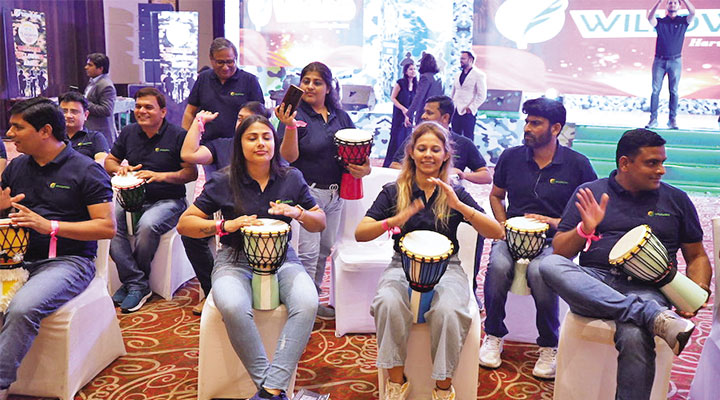
A rhythmic celebration uniting diverse communities in Mumbai, Pune, and beyond, African Drum Circle has become an in-thing for people of all age groups Priyanka Chandani explores the claims of those who have experienced the healing power of drumming, building connections, relaxation and joy for all things heady.
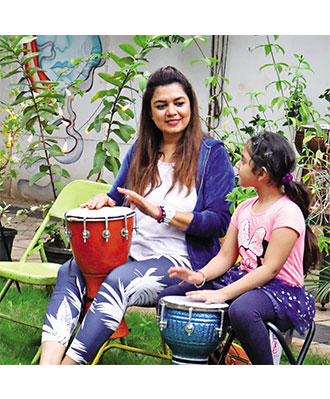
If you happen to hop around Bandra’s Carter Road in Mumbai, you may come across a group of people playing goblet-shaped hand drums called djembes. Known as the African Drum Circle, this isn’t just a weekly event; it’s a vibrant celebration of rhythm, community, and the soul of Mumbai. Similarly, the Pune Drum Circle, led by Upendra Dhawale, brings the city’s music scene alive with African tribal music, where diverse individuals converge, united by their shared passion for drumming.
“Pune is the cultural capital of Maharashtra, and with great support from the people, police, and the Pune Municipal Corporation (PMC), we’ve successfully performed on the streets and in public parks,” says Dhawale. “We are a community that spreads love and happiness through drumming.”
Circling the beats
As the sun dips below the horizon, the rhythmic beats of drums reverberate the skies with an infectious energy, creating a communal heartbeat in Mumbai, Pune, or any other city where this tradition thrives. The activity often takes place at sunset, and we’ve witnessed it in Auroville, a community township built by poet and philosopher Sri Aurobindo in the French town of Pondicherry. Some believe, in India, the drum circle was first performed in Auroville, and those who experienced it brought the tradition to their hometowns.
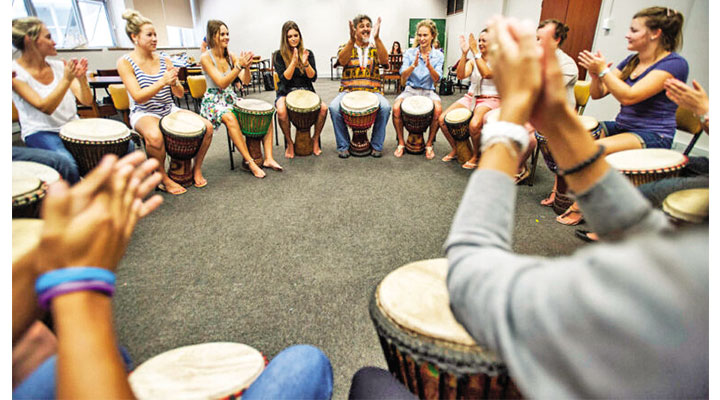
The repetitive motion of drumming can induce a meditative state, similar to mindfulness practices, calming the mind and reducing stress,” says Sigrid Lindemann, an integral regression and trauma therapist in Auroville.
Marching to their own drums
Drum circles bring together people of all ages and backgrounds, from seasoned musicians to novices, to share rhythm and connect and themselves. This inclusivity makes drum circles special, transcending barriers of age, background, and culture. More than just music, drum circles foster community and camaraderie, turning strangers into friends as they create music together. It’s about living in the moment, not performing for an audience.
Drumming out the blues
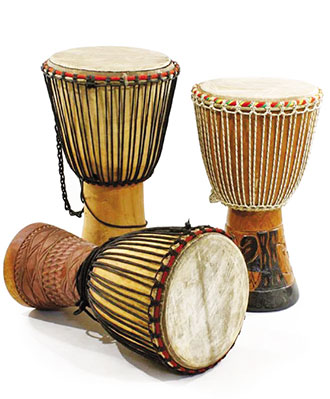
Participants use various percussion instruments, such as djembes, dumbeks, congas, and bongos. There is no teacher or students, just a group of people, drums, and a unique opportunity to tap into the healing power of music. Drum circles provide more than just entertainment; their emotional benefits are remarkable. Medical professionals use drum circles for stress reduction, with drumming as a channel for personal expression and emotional release.
Drum circles bring together people of all ages and backgrounds, from seasoned musicians to novices, to share rhythm and connect among themselves.
Stress-beaters, they!
“One significant benefit of drum circles in reducing stress and depression is their ability to inculcate a sense of community and connection. When individuals drum together, they create a unified rhythm that synchronizes their movements and breathing. This shared experience cultivates a feeling of belonging and support, which can be incredibly therapeutic,” says Mumbai-based Clinical Psychologist Sanika Goyal.
Drum it out!
A 2018 survey by Dr Ruth Lowry at the University of Essex found that drumming improved the motor skills and social health of kids with behavioural and emotional challenges. Newer research indicates that drumming decreases hyperactivity and inattention in teenagers with autism, benefiting their brain, body, and attention levels.
“Drumming has numerous physiological effects that promote relaxation and emotional well-being. The repetitive motion of drumming can induce a meditative state, like mindfulness practices, calming the mind and reducing stress,” says Sigrid Lindemann, an integral regression and trauma therapist in Auroville.
Circle of calm
Therapists believe the rhythmic sound of drums can soothe the nervous system, promoting relaxation and reducing anxiety and depression. “Drum circles offer a holistic approach to stress reduction and mental health support by combining the therapeutic benefits of music, community, and mindfulness,” says art therapist Tara Shweta.
Drum, enjoy, ra-tat-tat
Drum circles also promote social and community healing. Historically, drumming has been viewed with a spiritual focus, and its spirituality persists today. Beyond the spiritual, these circles forge relationships and bond communities, promoting fairness, healing, and conflict resolution.
“By participating in drum circles, I’ve alleviated my stress and depression while forging meaningful connections with others on a similar journey,” says Suresh Rao, who joined a drum circle in Auroville after being diagnosed with acute anxiety and depression post-divorce.
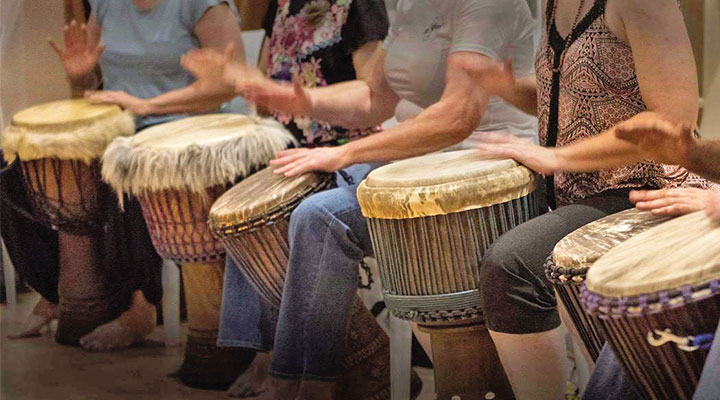
Pa rum pum pum pum
“There are multiple reasons for participating in drum circles. Whether for the love of music, physical or emotional health benefits, or healing communities and solving conflicts, there’s a circle for everyone,” says Keval Karthik, a regular participant in Mumbai’s Drum Circle.
In case you plan to participate in one of the drum circles in your city, no official lesson is needed to join; there’s no need to feel uncomfortable. The fun is in seeing where the rhythm leads. The collective rhythmic voice guides the music, offering healing for the body and mind and a wonderful experience.

